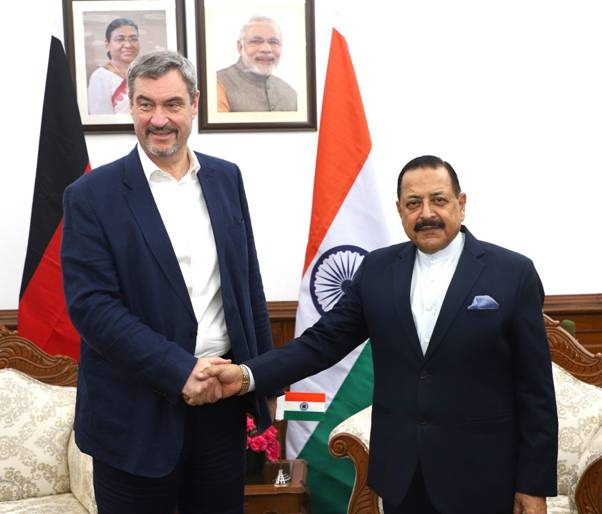India, Germany Strengthen Partnership in AI, Quantum Technologies, and Green Hydrogen
New Delhi, April 13:
India and Germany have agreed to expand their strategic partnership in cutting-edge areas such as artificial intelligence (AI), quantum technologies, and green hydrogen, aiming to drive innovation-led growth and sustainable development. This was announced by Union Minister of State (Independent Charge) for Science and Technology Dr Jitendra Singh following his meeting with Bavaria’s Minister-President Markus Söder in New Delhi on Sunday.
Dr Singh underlined the enduring and robust relationship between the two nations in the fields of science, technology, and innovation (STI). He emphasized the potential for enhanced cooperation in key sectors like clean energy, biotechnology, cyber-physical systems, and electric mobility.
“India has embarked on mission-mode programmes under the visionary leadership of Prime Minister Narendra Modi. We seek economic and sustainable solutions through scientific and technological interventions, and Germany is a natural partner in this endeavour,” Dr Singh stated.
He praised the Indo-German 2+2 collaboration model, which links universities and industries from both nations, calling it a futuristic initiative that strengthens innovation ecosystems and addresses global challenges with real-world solutions.
Dr Singh also highlighted India’s rise in the biotechnology sector, noting that the country now hosts over 3,000 biotech startups and is the world’s largest vaccine producer. He pointed to the recently announced BIOe3 policy, which focuses on leveraging biotechnology for energy, economy, and employment.
India’s vibrant startup ecosystem was also a focus of the discussions. With the country ranking third globally in terms of startups and unicorns, Dr Singh emphasized its vast potential for global technology partnerships.
He also shed light on the growing academic ties between the two countries, revealing that over 50,000 Indian students are currently studying in German universities, primarily in STEM (Science, Technology, Engineering, and Mathematics) fields—a number that has tripled over the past seven years.
Expressing optimism for the future, Dr Singh voiced the hope that more German students would explore Indian knowledge systems, including Oriental Studies and Indian culture, further enriching the bilateral academic and cultural exchange.
The meeting marks a significant step forward in Indo-German cooperation as both nations gear up to tackle global challenges through joint innovation, sustainability, and technology-driven development.


